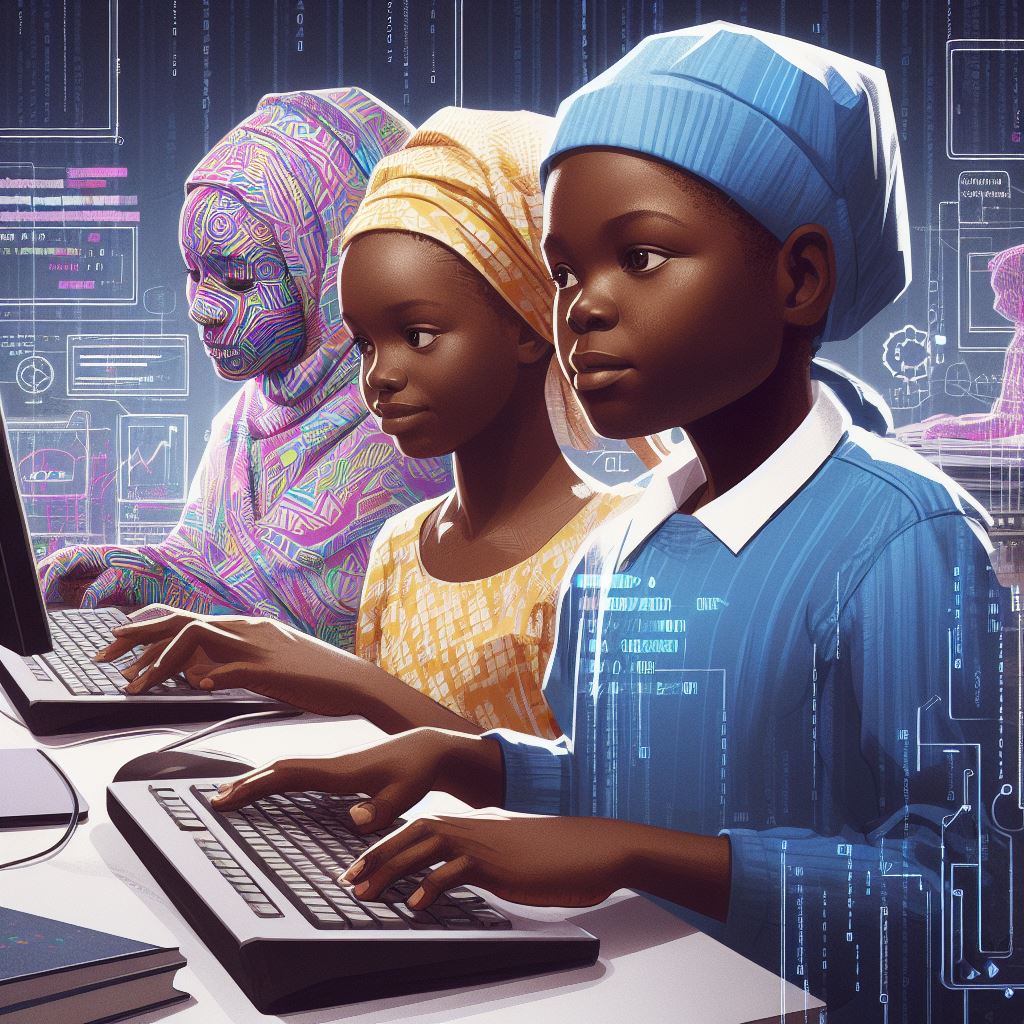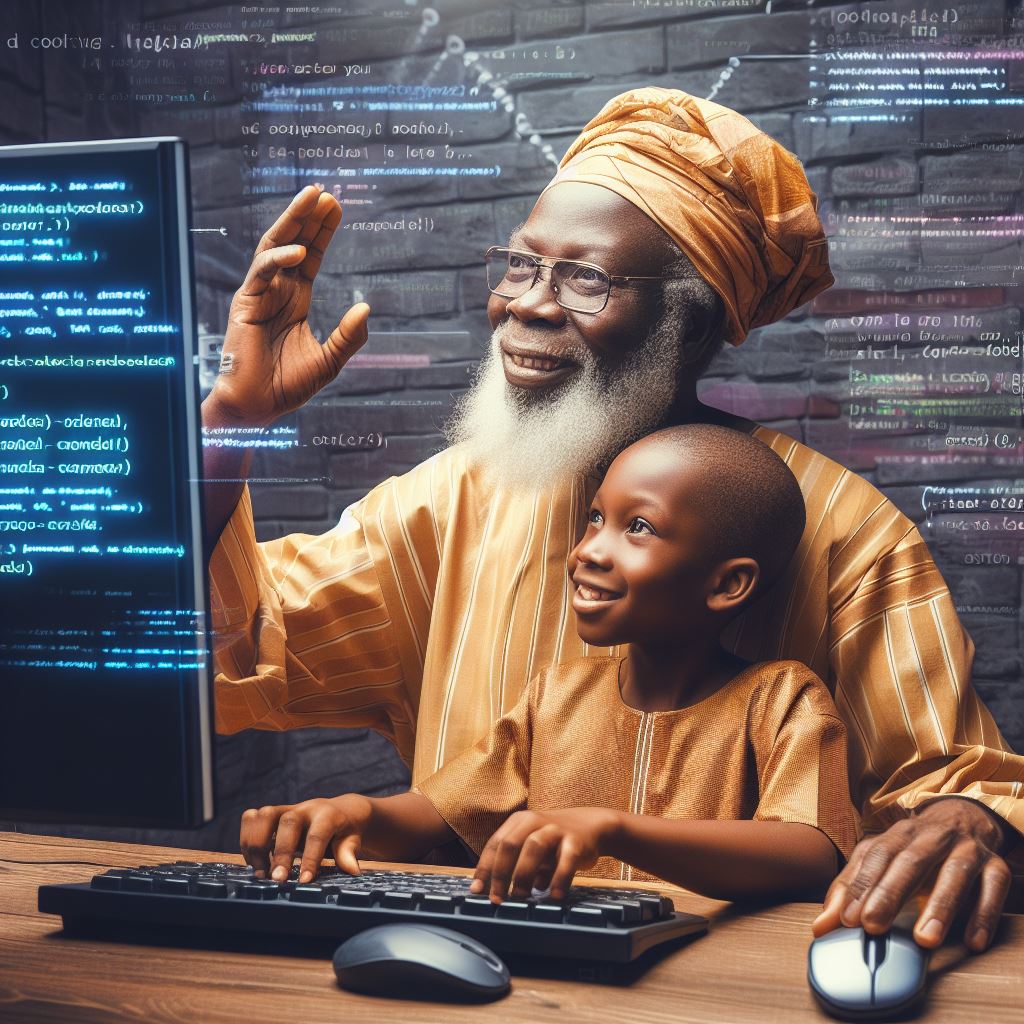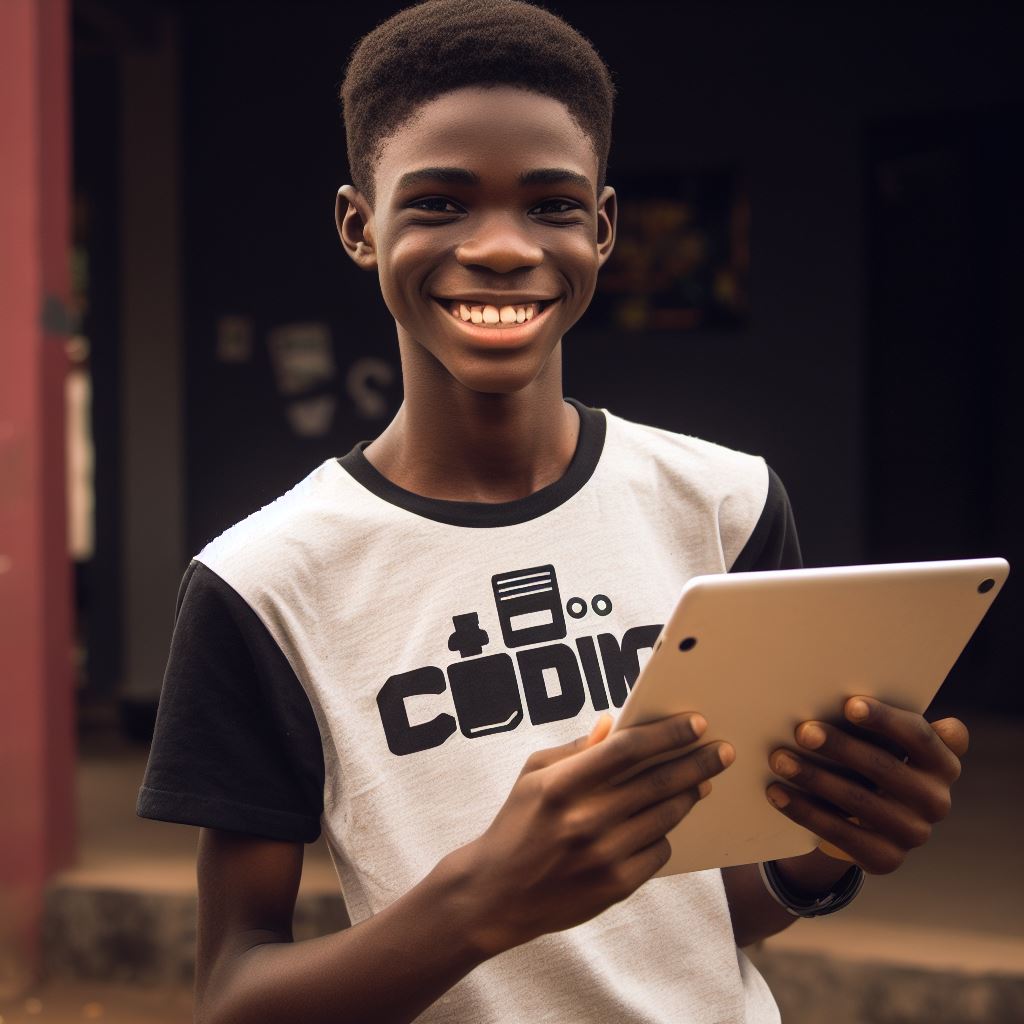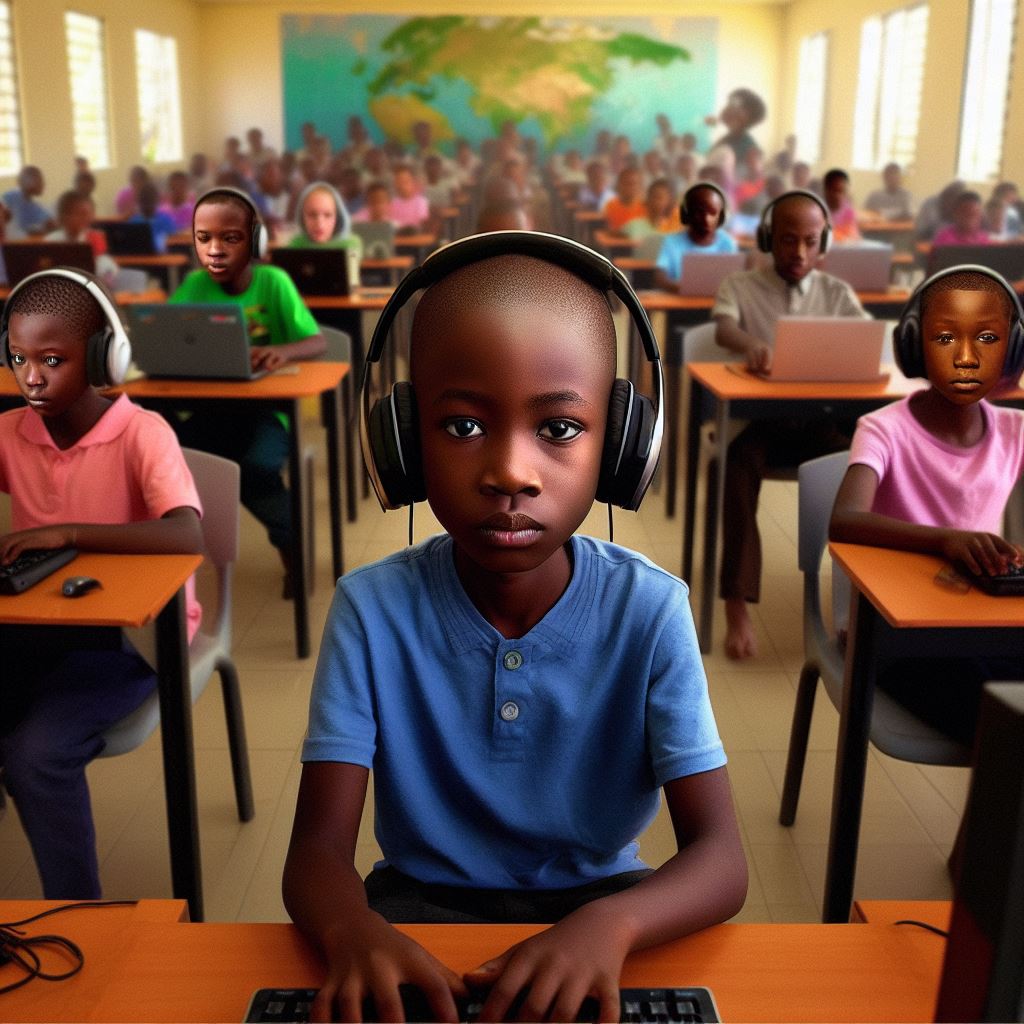Introduction
Scratch is an educational coding platform that offers Nigerian kids an interactive way to learn coding skills.
It provides a user-friendly interface with drag-and-drop features, making it easy for children to understand and implement programming concepts.
By using Scratch, Nigerian kids can develop critical thinking, problem-solving, and creativity skills.
They can create their own interactive stories, games, and animations, which enhances their digital literacy and encourages their curiosity.
Moreover, Scratch is a free platform, making it accessible to children from all socioeconomic backgrounds in Nigeria.
It also provides community support, allowing kids to share their projects and collaborate with other young coders.
The relevance of Scratch is immense in a country like Nigeria, where there is a growing demand for technology skills.
With the increasing reliance on digital platforms and the rise of job opportunities in the tech industry, equipping Nigerian kids with coding skills at an early age is crucial.
Scratch not only prepares them for future careers but also empowers them to contribute to the development of Nigeria’s digital economy.
By introducing Scratch as a coding platform, Nigerian kids can have an engaging learning experience while acquiring valuable skills for the future.
What is Scratch?
Scratch is a coding platform designed to help Nigerian kids learn programming in a fun and interactive way.
The MIT Media Lab’s Lifelong Kindergarten Group created Scratch. It is a free programming language and online community enabling users to craft interactive stories, games, and animations.
It provides a visual interface with a drag-and-drop system, making it easy for beginners to understand and use.
Key features and capabilities of Scratch
Here are some key features and capabilities of Scratch:
- Blocks-based Programming: Scratch uses colorful blocks of code that snap together to build scripts. It eliminates syntax errors and helps kids focus on logical thinking and problem-solving.
- Visual Interface: With Scratch, kids can create interactive projects by assembling graphical blocks instead of typing complex lines of code. It encourages creativity and experimentation.
- Sharing and Collaboration: Scratch boasts a lively online community for sharing and collaboration. This builds a sense of community, fostering mutual learning and inspiration among kids.
- Interactive Media Creation: Scratch empowers kids to integrate sounds, images, and even videos into projects. They craft characters, backgrounds, and animations to breathe life into their ideas.
- Scratch Cat: The friendly Scratch Cat is the mascot of Scratch. It serves as a guide and motivator, making the learning experience enjoyable and engaging for kids.
- Virtual Instruments: Scratch provides a variety of virtual instruments that kids can use to compose their own music and create sound effects for their projects.
- Event-driven Programming: Scratch uses an event-based model, which means that actions are triggered by specific events, such as when a key is pressed or when two sprites collide.
- Experimentation and Iteration: Scratch motivates kids to iterate and improve projects through trial and error. They test code, make changes, and witness immediate results, fostering hands-on learning.
- Educational Resources: Scratch provides tutorials, starter projects, and a community forum, aiding independent learning for kids and educators with comprehensive educational resources.
Scratch’s origins and development
Scratch was originally developed in 2003 as a research project to introduce young learners to programming concepts.
Unlock Your Unique Tech Path
Get expert tech consulting tailored just for you. Receive personalized advice and solutions within 1-3 business days.
Get StartedOver the years, it has evolved into a powerful tool used by millions of children and educators worldwide.
Its development was influenced by prior educational programming languages, such as Logo and Squeak, which focused on making coding accessible to beginners.
Scratch built upon these foundations and added unique features to enhance the learning experience.
Scratch has been widely adopted in Nigerian schools and educational institutions. It has empowered Nigerian kids to express their creativity, develop problem-solving skills, and gain a solid foundation in programming.
By using Scratch, Nigerian kids are not only learning how to code, but they are also developing critical thinking, collaboration, and communication skills.
It equips them with essential 21st-century skills that are invaluable in today’s digital age.
In essence, Scratch is an excellent coding platform for Nigerian kids. It provides a safe and supportive environment for them to learn and practice programming while having fun.
With its user-friendly interface and extensive community, Scratch opens up a world of possibilities for young learners in Nigeria.
Read: How Coding Benefits the Cognitive Skills of Kids
Why Scratch is Perfect for Nigerian Kids?
Scratch is the perfect coding platform for Nigerian kids, offering numerous benefits that can enhance their educational journey and empower them to engage with technology.
In this blog section, we will discuss why Scratch is relevant, how it promotes creativity, problem-solving, and critical thinking, and why it is a powerful tool for Nigerian kids.
Relevance of Scratch for Nigerian Kids and their Educational Journey
Scratch holds immense relevance for Nigerian kids in their educational journey.
With the Nigerian government placing emphasis on digital literacy, coding skills are becoming increasingly important in various industries.
Scratch provides a user-friendly interface, making it accessible and suitable for kids of all ages. It enables them to develop programming concepts and computational thinking skills from an early age.
Unlock Premium Source Code for Your Projects!
Accelerate your development with our expert-crafted, reusable source code. Perfect for e-commerce, blogs, and portfolios. Study, modify, and build like a pro. Exclusive to Nigeria Coding Academy!
Get CodeIn addition, Scratch aligns with the Nigerian educational curriculum, which aims to foster creativity, problem-solving, and critical thinking.
By using Scratch, kids can learn these skills in a fun and interactive way, creating projects and animations that showcase their imagination and problem-solving abilities.
Scratch: Promoting Creativity, Problem-Solving, and Critical Thinking
One of the major advantages of Scratch is its ability to promote creativity among Nigerian kids.
With Scratch, kids can unleash their imagination and create interactive stories, games, and animations.
By experimenting and exploring different coding blocks, they learn to think outside the box and express their ideas in a creative manner.
Scratch encourages problem-solving skills.
Through designing their own projects, kids face challenges and learn to troubleshoot and overcome obstacles.
They develop a problem-solving mindset, becoming adept at breaking down complex problems into smaller, manageable tasks. This helps them in their academic pursuits and prepares them for future challenges.
Critical thinking is another skill that Scratch nurtures in Nigerian kids.
By experimenting with various coding concepts and blocks, kids learn to analyze and evaluate their decisions, make logical connections, and think critically.
These skills are invaluable in today’s world, where critical thinking is essential for success in any field.
Empowering Nigerian Kids to Engage with Technology
Scratch empowers Nigerian kids to actively engage with technology, providing them with a strong foundation in coding and digital literacy.
It instils a sense of confidence and curiosity, encouraging them to explore different aspects of technology and discover their interests.
By using Scratch, Nigerian kids can develop skills that are highly sought-after in the job market, such as coding, problem-solving, and logical thinking.
This opens up numerous opportunities for them in the future, enabling them to become creators rather than just consumers of technology.
Furthermore, Scratch offers a supportive and collaborative community where kids can share their projects, learn from others, and seek feedback.
This sense of community fosters teamwork, communication, and a sense of belonging, ensuring that Nigerian kids feel connected and motivated to continue their coding journey.
Scratch perfectly suits Nigerian kids’ educational journey, promoting creativity, problem-solving, and critical thinking, and empowering them to engage with technology.
By introducing Scratch to Nigerian kids, we are nurturing the future generation of innovative thinkers and problem solvers in Nigeria.
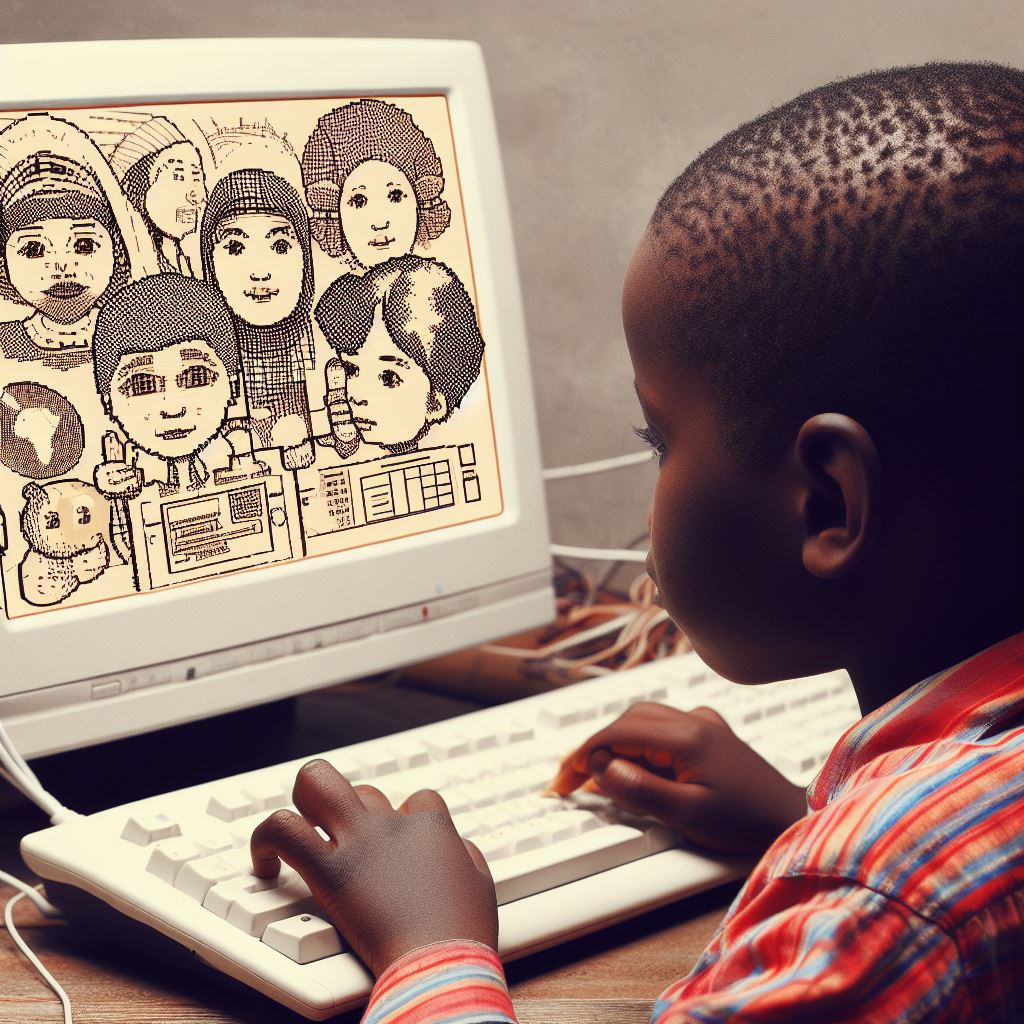
Benefits of Scratch for Nigerian Kids
Scratch is a coding platform that has revolutionized the way Nigerian kids learn and develop their coding skills.
With its user-friendly interface and interactive features, Scratch offers a wide range of benefits for young Nigerian learners.
In this section, we will delve into the various advantages that Scratch brings to the table for Nigerian kids.
- Enhanced Cognitive Skills: Scratch provides a platform for Nigerian kids to develop their cognitive abilities through coding and problem-solving.
- Logical Thinking: By using Scratch, Nigerian kids are encouraged to think logically and sequentially, which improves their problem-solving skills.
- Teamwork and Collaboration: Scratch allows kids to collaborate on projects, fostering teamwork and enhancing their communication and social skills.
- Creativity and Imagination: Scratch empowers Nigerian kids to explore their creativity and express their ideas through programming and visual storytelling.
- Improved Math and Language Skills: Through Scratch, Nigerian kids can sharpen their mathematical and language skills as they tackle programming challenges and create interactive projects.
Key areas where coding skills acquired from Scratch can be highly beneficial
Moreover, Scratch has the potential to open up a world of future career opportunities for Nigerian kids in the technology industry.
Here are some of the key areas where coding skills acquired from Scratch can be highly beneficial:
- Software Development: Nigerian kids who learn coding through Scratch are equipped with a solid foundation for pursuing a career in software development.
- Web Development: Scratch enables Nigerian kids to understand the fundamentals of web development, paving the way for potential careers in front-end or back-end development.
- Data Analysis: With Scratch, Nigerian kids can learn the basics of data analysis, a skill that is increasingly in demand across various industries.
- Computer Science: Scratch acts as a launching pad for young Nigerian learners who want to explore computer science and pursue advanced studies in the field.
Most importantly, as the world becomes more technology-driven, coding skills are becoming essential in countless industries and job roles.
Nigerian kids who start learning coding early through Scratch have a head start in this competitive landscape.
Scratch is a game-changer for Nigerian kids and coding education. It not only enhances cognitive skills, logical thinking, and teamwork but also opens doors to future career opportunities.
By embracing Scratch, Nigerian kids can become proficient in coding and empower themselves to thrive in the technology-driven world of tomorrow.
Read: How to Make Coding Fun: 7 Tips for Kids and Parents
How to Get Started with Scratch
Getting started with Scratch is an exciting journey for Nigerian kids who are interested in coding. This coding platform provides a fun and interactive way for children to learn and explore the world of programming.
Here are some step-by-step instructions to help them begin their Scratch adventure.
Create an account
Head over to the Scratch website and click on the “Join Scratch” button. Fill out the registration form with a username, password, and email address.
Make sure to choose a username that reflects your personality or interests.
Explore the interface
Once you’ve created an account and logged in, take some time to familiarize yourself with the Scratch interface.
The main screen is divided into three sections: the stage, the block palette, and the script area. Spend some time experimenting with the different blocks and see what they do.
Start a new project
Click on the “Create” button to start a new project. This will open a blank canvas where you can begin to create your own interactive stories, animations, and games.
Don’t worry if you’re not sure where to start – Scratch provides plenty of helpful resources to guide you.
Learn from tutorials
Scratch offers a wide range of online tutorials that can help you learn the basics.
From simple animations to complex games, these tutorials provide step-by-step instructions on how to build various projects. Explore the tutorial section and choose one that interests you.
Join the Scratch community
One of the best things about Scratch is its community of creators.
Join the Scratch community to connect with other Nigerian kids who are also learning and creating with Scratch. You can share your projects, get feedback, and even collaborate with others on exciting projects.
Share your projects
Once you’ve created something awesome, don’t forget to share it with the world. Click on the “Share” button to publish your project on the Scratch website.
This way, you can inspire and motivate others with your creations.
Don’t be afraid to explore
Scratch is all about exploration and creativity.
Take some time to play around with different blocks, experiment with new ideas, and don’t be afraid to make mistakes. Learning from your mistakes is an essential part of the coding process.
Challenge yourself
As you become more comfortable with Scratch, challenge yourself to create more complex projects. Set goals and push yourself to learn new things.
The more you practice, the better you’ll become.
In addition to these step-by-step instructions, there are plenty of online resources available to further enhance your Scratch experience.
Websites like ScratchEd and ScratchJr provide additional educational materials, tutorials, and activities to help you on your coding journey.
Tips and recommendations
To effectively learn and explore Scratch, here are some tips and recommendations:
- Start small: Begin with simple projects and gradually move on to more complex ones. This will help you build a solid foundation and gradually increase your coding skills.
- Collaborate with others: Join a Scratch club or meet other kids who are interested in coding. Collaborating with others can provide new perspectives and ideas for your projects.
- Don’t underestimate debugging: Debugging is a crucial part of coding. When something doesn’t work as expected, don’t get discouraged.
Take the time to analyze your code, identify the issues, and fix them. - Remix existing projects: Scratch enables remixing and modifying projects from others, a fantastic method to learn, experiment with code and add unique touches to existing creations.
By following these steps, utilizing available resources, and adopting effective learning strategies, Nigerian kids can embark on an exciting coding journey with Scratch. Happy coding!
Read: Girl-Powered: Encouraging Girls to Code in Nigeria
Success Stories of Nigerian Kids Using Scratch
Scratch, the coding platform for kids, has been making waves in Nigeria, empowering young minds and sparking creativity.
Let’s take a look at some inspiring success stories of Nigerian kids who have achieved great things using Scratch.
Fatima’s Interactive Storytelling Project
- Fatima, a 12-year-old girl from Lagos, used Scratch to create an interactive storytelling project.
- Her project, titled “The Adventures of Zara,” allowed users to navigate through a virtual world and make decisions that shaped the outcome of the story.
- Fatima’s project caught the attention of a local game development company, who offered her a mentorship opportunity.
- She now dreams of becoming a game designer and hopes to inspire other young girls to pursue their passion for coding.
Ahmed’s Award-Winning Animation
- Ahmed, a 10-year-old boy from Abuja, impressed the jury at a national coding competition with his Scratch animation project.
- His project, titled “Save the Environment,” showcased the impact of pollution on wildlife and proposed sustainable solutions.
- Ahmed’s animation won the first prize in the competition, earning him recognition from local media and educational institutions.
- He now conducts workshops to teach other kids how to create meaningful animations using Scratch.
Aisha’s Collaborative Game
- Aisha, a 13-year-old girl from Kano, collaborated with her friends to create a multiplayer game using Scratch.
- Their project, called “Maze Mayhem,” allowed players to navigate through a maze and compete against each other in real-time.
- Aisha and her team showcased their game at a local tech fair, where it received positive feedback from visitors and industry professionals.
- Impressed by their creativity and teamwork, a prominent tech company offered Aisha and her friends internships at their organization.
Ibrahim’s Innovative Educational Tool
- Ibrahim, an 11-year-old boy from Kaduna, used Scratch to develop an innovative educational tool for teaching mathematics.
- His project, named “MathQuest,” gamified the learning process and helped students grasp mathematical concepts through interactive activities.
- Ibrahim’s tool gained recognition from teachers and parents for its effectiveness in making learning fun and engaging.
- He now plans to refine his project and make it accessible to schools across Nigeria, aiming to revolutionize math education.
These success stories highlight the immense impact Scratch has had on Nigerian kids and their future prospects.
By providing a user-friendly platform for coding, Scratch has empowered children to express their creativity, problem-solving skills, and critical thinking abilities.
These projects have not only garnered recognition but also opened doors of opportunity for these young talents.
From mentorship opportunities to media attention to industry internships, Scratch has laid the foundation for a bright future for these Nigerian kids.
Overall, Scratch is not just a coding platform; it is a catalyst for transformation.
As more Nigerian kids embrace Scratch and unleash their potential, we can expect to witness even more incredible success stories from the budding talents of Nigeria.
Read: Teaching Kids to Code: Homeschool vs Coding Camps
Conclusion
Scratch is a coding platform that offers Nigerian kids a fun and interactive way to learn coding.
Through Scratch, kids can develop important skills such as problem-solving, critical thinking, and creativity.
By introducing kids to coding at an early age, Nigerian parents and educators can prepare them for the future job market.
Additionally, coding skills are essential for their personal growth, enabling them to pursue careers in technology-driven industries.
We encourage Nigerian parents, educators, and kids to explore Scratch as a coding platform and take advantage of its numerous benefits.
By providing access to platforms like Scratch, we can nurture the next generation of Nigerian coders and innovators.
Let’s empower our kids to become creators of technology and equip them with the skills they need for a successful future.
Together, we can shape the digital landscape of Nigeria and contribute to the country’s technological advancement.

